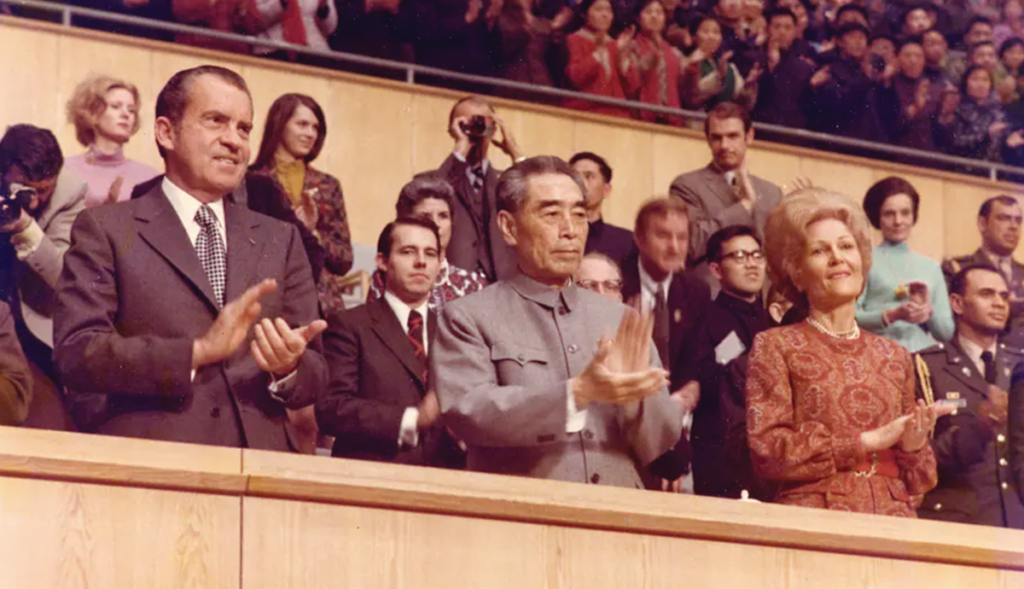Table of Contents
Table Tennis, also known as Ping Pong in various regions of the world, is massively popular across the globe. From being a fun activity to becoming an internationally competitive sport, table tennis has come a long way. Apart from being a sport with a rich history, table tennis has also played a crucial role in rectifying international relations between global and political superpowers.
The Game Beyond Borders
The dominance of China in the world of Table Tennis is second to none. From the Olympics to the world championships, the Chinese contingent has always shown its ascendancy on the global stage.
Table Tennis played a major role in bringing China and the United States, two global superpowers together during the Cold War era when both nations were in a rift due to numerous political differences.
During the 1940s, the United States of America observed the People’s Republic of China as an aggressor nation. During the Korean War in 1950, US President Harry S. Truman sent the American army to South Korea to support their army, who were fighting against North Korea.
On the other hand, China also joined the war in support of North Korea. It’s stated that their decision to step into the war was fueled by Chinese xenophobic attitudes, security concerns, expansionist tendencies, and communist ideology.
The war came to an end in July 1953, when military commanders from the United States, the Korean People’s Army, and the Chinese People’s Volunteer Army signed the Korean Armistice Agreement. However, the relationship of the United States and China got even worse.
As a result of the political differences, the United States also pushed an economic embargo on China, which led to the stoppage of diplomatic or economic trade between both nations. However, after a couple of decades, the US as well as China realized the importance of trade and restoring relations.
China wanted to restore its relationship with the US because of its degenerating friendship with the Soviet Union. On the other hand, the US required China to ignite peace negotiations with North Vietnam. Hence, to improve diplomatic relations, “Ping-Pong Diplomacy” was used by the countries.
Iconic Moments in Diplomacy
In 1971, China’s government, led by Mao Zedong, invited the table tennis contingent of the USA to their country. During the same time, the table tennis team of the US was in Nagoya, Japan, where they were competing in the 31st World Table Tennis Championship and the tournament was China’s return to World table tennis after a six-year-long hiatus.
During a practice session in China, American paddler Glenn Cowan failed to board the bus to his hotel while he was training alongside China’s Liang Geliang. The Chinese team later helped Cowan reach his hotel and welcomed him in a warm and friendly way.
Zhuang Zedong, who was a three-time men’s singles world champion, also spoke to Cowan with the help of an English translator and presented the American with a silk-screen portrait of the Huangshan Mountains.
Interestingly, the invitation was accepted by the United States The American table tennis contingent later played a few friendly matches with the Chinese team and they also visited different tourist attractions across the country.
Next year, USA president Richard Nixon also visited China, which was a historic event as the 37th US president travelled to Shanghai and Beijing to meet Zedong, and the two had a great conversation sweetening the bitter relations between the two nations.
Indian Incidences
India is also slowly rising in the sport in terms of competition as well as popularity. The last few editions of the Commonwealth Games and the Asian Games have been a huge booster for the paddlers who are looking for top-level competition to improve their own game.
Moreover, as different athletes from various nations are travelling to the subcontinent, they are also getting involved in Indian culture. In addition to that, the involvement of the Table Tennis Federation of India with other national associations.
In 1987, when the World Table Tennis Championships were held in New Delhi, India, the sub-continent promised the Israeli table tennis contingent that visas would be issued to the team and they would be able to attend the Championships. However, their visas were eventually denied, but it was one of the first steps in efforts to normalize ties between Israel and India.
On several occasions, especially in the late 1990s, India tried to make their relationship healthy with Pakistan. Not only table tennis but even the likes of cricket were used by the government to heal the sore relationship between the two nations.
Sport as a Universal Language
Sports have always been seen as the safest way of rectifying or improving diplomacy between nations. Diplomacy, which is a highly sensitive task of safeguarding as well as promoting interests of various cultures becomes easier when it’s done in the sports way.
In addition to that, friendly tournaments in various sports are also being organized by different committees around the globe. The main purpose of these tournaments is to ignite friendly relations and raise awareness about important issues.
In 2015, the United Nations developed a list of ‘Sustainable Development Goals’ making a note of the role of sports as a crucial factor in achieving some of the goals like sustainable communities, peace, justice, and innovation across different fields.
Equality on the field is one of the most important core values of any sport and the Olympic Aid also introduced Right to Play, an international non-profit organization that envisions children struck with poverty, war, or disease to rise above everything using professional sports as a tool.


